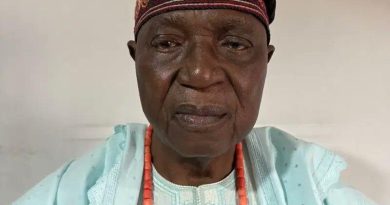Court Sacks IGP Alkali Baba
Less than 48 hours to the inauguration of President-elect, Asiwaju Bola Ahmed Tinubu, the Inspector-General of Police (IGP), Usman Baba Alkali, has been sacked.
A Federal High Court has declared him anillegal occupant of the IGP office.
The verdict was delivered by Justice Fatun Riman of a Federal High Court sitting in Awka, Anambra State.
Justice Riman ruled that Alkali’s appointment and ongoing tenure in office were “illegal and unconstitutional.
”The order was made in a judgement in a claim submitted by Okechukwu Nwafor, a tax payer, with the case number FHC/AKW/CS/58/2023.Justice Riman also ruled that only an officer of the indicated rank with four (4) years of service, not one with less than four (4) years, can be appointed as IGP.
The court also ordered Alkali to stop parading himself as the Inspector-General of Police.
The court ordered the President to convene a meeting of the Nigeria Police Council to appoint a new Inspector General of Police who will hold office for four years.
Defendants in the suit are the President of the Federal Republic of Nigeria, Usman Alkali Baba, Attorney General of the Federation and Minister of Justice and Nigeria Police Council.
In the judgement, the court declared that “by a community reading of the provisions of Sections 215 (a) and 216 (2) of the 1999 Constitution of the Federal Republic of Nigeria (as amended), Sections 7 (2) & (6) and 18 (8) of the Nigeria Police Act, 2020, the appointment of the 2nd Defendant (Alkali) is unlawful and invalid, the 2nd Defendant not being a person capable of fulfilling the mandatory requirement of tenure of office needed to hold the office of the Inspector General of Police and/or the provisions of the 1999 Constitution of the Federal Republic of Nigeria (as amended) having not been complied with.
More so, the court made a declaration that “the 2nd Defendant (Alkali) is not qualified to hold the office of the Inspector General of Police for the sole reason that doing so will lead to absurdity which will amount to a complete breach and total disregard for the clear and unambiguous provision of Section 7 (6) of the Nigeria Police Act, 2020.
Justice Riman observed that the IGP, being a public servant and by virtue of the fact that he is a member of staff of the Nigeria Police Force, an authority established from the Federation by Section 214 (1) of theConstitution and in subject of the Federal Public Rules 299 (PSR) thereof which provides for the compulsory retirement of all grades of public service officers at the age of 60 or 35 years of service, whichever comes first.
“In the instant case, the 2nd Defendant’s birth day comes first. By the said Rule, the 2nd Defendant is obliged to step down on March 1st 2023.
“The PSR retirement age provision, is mirrored in section 18 (8) of the Police Act, on the word “Shall” is used in the provision, it is mandatory.
“Section 7 (6) of the Police Act provides for a four year term or tenure for the Inspector General of Police and the word “Shall” is also used in the said provision” the court stated.Justice Riman observed that despite the prerogative power of the President, he is limited to the provisions of the Constitution, adding that the IGP retirement is statutory and constitutional issue and no other law of the land can change the ground norm.
On the issue of the locus standi of the Plaintiff, the trial judge observed that locus standi is a central concept in the administration of justice and it delineates not only the jurisdiction of the Court to entertain matters brought before them but also restricts access to Courts to perform with genuine grievance.
“Thus, it is firmly established that a Plaintiff who fails to satisfy the “interest” and “injury test” will be denied the legal standing to sue to challenge any perceived act of unconstitutionality.
“It is my view, however, that required of locus standi is not necessary on constitutional cases as the application of the concept could impede the administration of justice.
The court noted that there is liberalisation of the concept of locus standi where it involves constitutional matters, stressing that the deposition of the Plaintiff in his affidavit as a Nigerian and tax payer has not been controverted.




